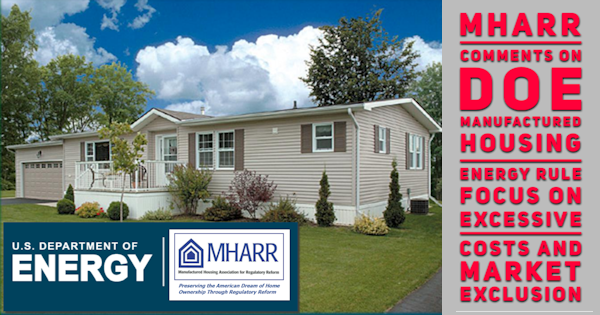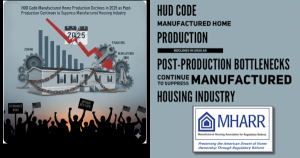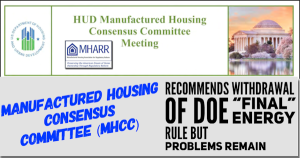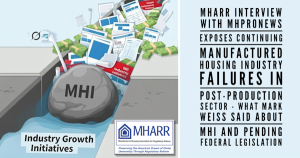MHARR Comments on DOE Manufactured Housing Energy Rule Focus on Excessive Costs and Market Exclusion

Washington, D.C., August 4, 2021 – The Manufactured Housing Association for Regulatory Reform (MHARR), in written comments submitted to the U.S. Department of Energy (DOE) see, copy attached, has stated that any DOE energy standards for manufactured housing must not result in excessive purchase price increases that would exclude millions of lower and moderate-income families from the manufactured homes they rely on for affordable housing and homeownership.
MHARR’s comments were filed in connection with the development of a DOE “Environmental Impact Study” (EIS) under the National Environmental Policy Act of 1969 (NEPA) — which marks the first phase of the current round of rulemaking for manufactured housing energy standards pursuant to the Energy Independence and Security Act of 2007 (EISA). The MHARR comments call on DOE to properly consider the full cost of any DOE rule on the HUD Code manufactured housing market and manufactured housing consumers, something that did not occur when DOE published its first proposed EISA-based manufactured housing standards in 2016 following a highly-flawed, sham “negotiated rulemaking” process.
That full cost, as explained by MHARR, includes not just the purchase-price impacts of draconian energy measures mandated by the 2021 version of the International Energy Conservation Code (IECC) – which in themselvescould exclude millions of households from the HUD Code market based on recent analyses – but also: (1) testing, enforcement and regulatory compliance costs; (2) the ongoing, never-ending upward spiral of regulation-driven costs that would be necessitated by cyclical IECC upgrades, as required by EISA; and (3) the disparate and disproportionate purchase price impacts of any proposed DOE rule on racial equity and economic justice, contrary to a series of Executive Orders issued by President Biden since he took office in January 2021.
When all of these drastic and highly damaging impacts are considered, MHARR maintains and asserts that the IECC (including, but not limited to its 2021 version) is not an appropriate code for manufactured housing and should not be the basis for any proposed manufactured housing energy standards. Instead, manufactured housing energy standards should be based on existing federal manufactured housing law and the full procedures mandated by such law, including but not limited to the consensus processes of the HUD Manufactured Housing Consensus Committee (MHCC).
In Washington, D.C., MHARR President and CEO, Mark Weiss, stated: “The latest federal data shows that square foot-by-square foot, today’s manufactured homes are already energy cost-efficient. The fundamental affordability of modern manufactured homes, which millions of lower and moderate-income homebuyers rely on, should not be sacrificed in order to advance extreme ideological agendas or the desire of energy special interests to ‘legislate’ greater demand for their products through baseless, high-cost regulation. Increased purchase costs, again as shown by government data, would have the harshest exclusionary impacts on racial and ethnic minorities, directly contrary to the policies of the Biden Administration. Instead of singling-out manufactured homebuyers for such harsh treatment, the Biden Administration should reject IECC-based energy standards for HUD Code homes and instead allow the MHCC consensus process to work as designed, intended and mandated by Congress.”
The Manufactured Housing Association for Regulatory Reform is a Washington, D.C.-based national trade association representing the views and interests of independent producers of federally-regulated manufactured housing.


Washington, D.C., August 4, 2021 – The Manufactured Housing Association for Regulatory Reform (MHARR), in written comments submitted to the U.S. Department of Energy (DOE) see, copy attached, has stated that any DOE energy standards for manufactured housing must not result in excessive purchase price increases that would exclude millions of lower and moderate-income families from the manufactured homes they rely on for affordable housing and homeownership.
MHARR’s comments were filed in connection with the development of a DOE “Environmental Impact Study” (EIS) under the National Environmental Policy Act of 1969 (NEPA) — which marks the first phase of the current round of rulemaking for manufactured housing energy standards pursuant to the Energy Independence and Security Act of 2007 (EISA). The MHARR comments call on DOE to properly consider the full cost of any DOE rule on the HUD Code manufactured housing market and manufactured housing consumers, something that did not occur when DOE published its first proposed EISA-based manufactured housing standards in 2016 following a highly-flawed, sham “negotiated rulemaking” process.
That full cost, as explained by MHARR, includes not just the purchase-price impacts of draconian energy measures mandated by the 2021 version of the International Energy Conservation Code (IECC) – which in themselvescould exclude millions of households from the HUD Code market based on recent analyses – but also: (1) testing, enforcement and regulatory compliance costs; (2) the ongoing, never-ending upward spiral of regulation-driven costs that would be necessitated by cyclical IECC upgrades, as required by EISA; and (3) the disparate and disproportionate purchase price impacts of any proposed DOE rule on racial equity and economic justice, contrary to a series of Executive Orders issued by President Biden since he took office in January 2021.
When all of these drastic and highly damaging impacts are considered, MHARR maintains and asserts that the IECC (including, but not limited to its 2021 version) is not an appropriate code for manufactured housing and should not be the basis for any proposed manufactured housing energy standards. Instead, manufactured housing energy standards should be based on existing federal manufactured housing law and the full procedures mandated by such law, including but not limited to the consensus processes of the HUD Manufactured Housing Consensus Committee (MHCC).
In Washington, D.C., MHARR President and CEO, Mark Weiss, stated: “The latest federal data shows that square foot-by-square foot, today’s manufactured homes are already energy cost-efficient. The fundamental affordability of modern manufactured homes, which millions of lower and moderate-income homebuyers rely on, should not be sacrificed in order to advance extreme ideological agendas or the desire of energy special interests to ‘legislate’ greater demand for their products through baseless, high-cost regulation. Increased purchase costs, again as shown by government data, would have the harshest exclusionary impacts on racial and ethnic minorities, directly contrary to the policies of the Biden Administration. Instead of singling-out manufactured homebuyers for such harsh treatment, the Biden Administration should reject IECC-based energy standards for HUD Code homes and instead allow the MHCC consensus process to work as designed, intended and mandated by Congress.”
The Manufactured Housing Association for Regulatory Reform is a Washington, D.C.-based national trade association representing the views and interests of independent producers of federally-regulated manufactured housing.














